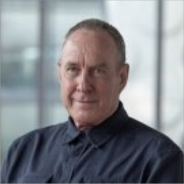Swinburne University of Technology - Lehigh University
Transformative Education for Sustainable Social Impact (TESSI) Institute
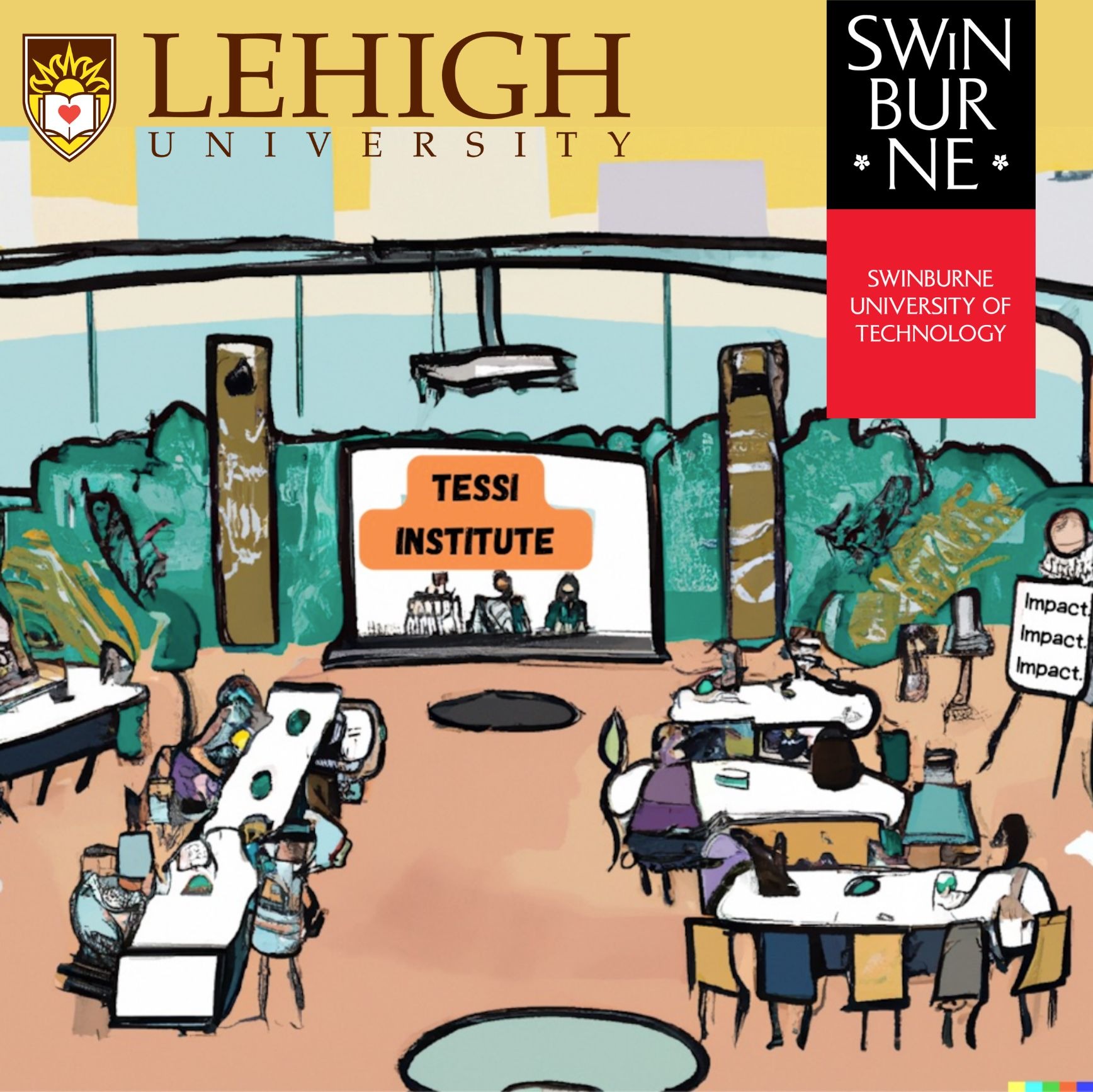
Dates: December 9 - 13, 2024
Location: Australian Graduate School of Entrepreneurship (AGSE) Building, Swinburne University of Technology, Hawthorn, Melbourne, Australia
Host: The Australian Graduate School of Entrepreneurship & School of Business, Law & Entrepreneurship
Number of Participants: 50
Costs: A fee of $250 AUD will be charged to cover workshop expenses and catering (morning and afternoon tea). Excludes lunch, travel and accommodation.
Sponsors: School of Business, Law & Entrepreneurship, Bruce Wong & Foot Solutions Australia, Reach for Your Future Foundation, HCI Australia & the Human Rights Measurement Initiative."
Partners: Civika Asian Development Academy, Planetary Regeneration Lab.
Expectation: Participants be engaged in the entire week-long workshop.
Program Summary
The Transformative Education for Sustainable Social Impact (TESSI) Institute is a one-week interdisciplinary workshop designed to empower faculty, community, non-governmental organizations and other non-profit organization practitioners with the expertise and tools needed to reshape their courses, curricula and programs in response to global grand challenges. Rooted in the principles of creative inquiry and the praxis of Humanitarian Engineering and Social Entrepreneurship, the TESSI Institute offers educators and practitioners an innovative framework for crafting curricula/programs that engage students and communities in authentic, real-world projects, where they co-create innovative, practical, and sustainable solutions that address the needs of vulnerable populations and communities facing social, economic, and environmental challenges.
At the completion of workshop, participants will be capable in building toolkits for delivering sustainable impact, while preparing their students and/or organisations to identify problems, design solutions, develop business models, and leverage storytelling. This method places students and staff at the centre of the knowledge discovery process, using a “hands-on, hearts-on” approach to make meaning based on their lived experiences / professional expertise. Participants take radical ownership in their projects, while faculty and organisation mentors become partners and co-creators striving to propel their projects forward on the journey towards tangible, sustainable impact. Participants will become catalysts for transformative programs who foster a new generation of socially conscious leaders ready to tackle the complex challenges of our time. TESSI is envisioned as a week of inspiration, skills-building and network-building with a deep commitment to driving sustainable social impact programs.
TESSI Institute Certificates will be given to participants upon completion of this workshop. Participants are expected to deploy the tools and techniques in their universities and organisations and will be encouraged to join the pool of trainers to help teach future cohorts. Participants who complete the program will also become Asia Pacific Education Impact Fellows and join a growing network of TESSI Institute Alumni.
For Participants
The Transformative Education for Sustainable Social Impact (TESSI) Institute aims to deliver meaningful learning outcomes for workshop participants, focusing on transforming their educational approaches and fostering a commitment to sustainable social impact through community-engaged learning, research and entrepreneurial action.
The explicit goals of this institute include:
- Understanding of Global Grand Challenges: Participants will gain a deep understanding of global grand challenges, including social, economic, and environmental issues, and their interconnectedness. They will explore various approaches to integrating global grand challenges into courses, research agenda, and service activities.
- Creative Inquiry: Through a series of case studies and interactive workshops, faculty members will learn about creative inquiry and the praxis of humanitarian engineering and social entrepreneurship. They will acquire the knowledge and skills necessary to apply these concepts in their courses.
- Curriculum Design and Innovation: Participants will develop the ability to design innovative curricula that actively engage students in authentic, real-world projects. They will learn how to create educational experiences that empower students to work on practical solutions to challenges identified by community partners.
- Problem Identification and Solution Design: Participants will gain experience in guiding students to identify complex problems and design effective, sustainable solutions. They will foster critical thinking and problem-solving skills in their students. There will be an emphasis on how faculty can right-size problems to challenge students while not overwhelming and paralyzing them.
- Sustainable Business Model Development: Participants will acquire the knowledge and tools necessary to guide students in developing sustainable business models for their solutions. This includes understanding the principles of (social) entrepreneurship and environmental, economic, and social sustainability.
- Storytelling for Impact: Faculty will explore the art of storytelling and its power in conveying the impact of their students' projects. They will be able to inspire and engage students, stakeholders, and social investors through compelling narratives.
- Active Learning and Student Engagement: Faculty will learn how to implement a hands-on, hearts-on approach to teaching, making students active participants in the knowledge discovery process. They will foster student engagement and nudge students to take full ownership of their learning and their projects.
- Mentorship and Co-Creation: Participants will understand the importance of becoming mentors and co-creators with their students, guiding them through project development and providing support and expertise in a just-in-time manner.
- Sustainable Impact Assessment: Faculty members will develop skills in assessing the long-term, sustainable impact of projects and solutions. They will learn the fundamentals of how to measure and evaluate the outcomes of their educational approaches.
- Network Building: The workshop will enable participants to build a network of like-minded educators, researchers, and experts in the field of impact-focused education. This network will serve as their community and sounding board for new ideas and initiatives. The facilitators will also connect them to other relevant networks such as IEEE SIGHT, EPICS in IEEE, etc. We are also inviting participants from the Philippines, Bangladesh, Hong Kong, and other countries to share their experiences and join this network.
- Commitment to Social Impact: Faculty members will leave the workshop with a commitment to fostering a new generation of socially conscious engineers, entrepreneurs, and leaders. They will explore how engineering is or can be as much of a care-giving profession.
- Inspiration and Motivation: TESSI aims to inspire and motivate participants, leaving them with a sense of purpose and enthusiasm for their role in transforming education and addressing global grand challenges.
8-9 am Registration desk open. Tea/Coffee. AGSE building ground floor lobby area.
9-9:45 am Jason, Khanjan: Welcome to TESSI Down Under, TESSI Institute, introductions & housekeeping. AGSE Lecture Theatre Level 2.
9:45-10:45 am Khanjan Framing Talk: Why TESSI? AGSE Lecture Theatre Level 2.
10:45-11:15 am Morning Tea. AGSE Foyer.
11:15-12:15 pm Breakout Discussions: State of Australian Higher Education. AGSE Lecture Theatre Level 2.
12:15-12:30 pm. Wrap up the morning session and discuss lunch logistics and afternoon session info. AGSE Lecture Theatre Level 2.
12:30-1:30 Lunch. Restaurants along Glenferrie and Burwood roads.
1:30-2:15 pm Introduction to TESSI Projects. Khanjan to discuss group project challenge proposal briefs/specs. Discuss rubric. Assign participants to their proposal groups. AGSE Lecture Theatre Level 2.
2:15-3pm Big Friendly Giants (BFGs) Yarn 1: Jasper Menor, Okiru Collective. https://www.okiru.com.au/pages/about-us Be inspired by social impact community builders. Mentimeter Individual Activity: The 3 Okiru Ponderings. AGSE Lecture Theatre Level 2.
3-3:30pm Afternoon Tea and mingle discussions AGSE Foyer.
3:30-5 pm Intro to Carbon Literacy Training (CLT) Certification Program by Dr. Chamilla Perera, Associate Professor Chandana Hewege and facilitators. AGSE Lecture Theatre Level 2.
5:15-5:30 pm Jason & Khanjan: Reflection. Wrap up Day 1 and Discuss Day 2. Mentimeter Individual Activity: Day 1 Word Cloud. AGSE Lecture Theatre Level 2.
8-8:30 am Arrive AGSE building ground floor lobby area. (TESSI Next_Gen cohort to join us for the day. 10 high school students who will work with Aunty Bridgette and Uncle Elmer on a Planetary Regeneration Proposal presentation. The students will present as 2 teams at the end of the day. Parents invited)
8:30-8:50 am All that we share activity by Jason. AGSE building ground floor lobby area.
9-10 am Tee-up with Program Fundamentals Template. Question Formulation Technique: Khanjan AGSE Lecture Theatre Level 2. TESSI Next_Gen workshop with Aunty Bridgette and Uncle Elmer in AGSE 110
10-10:45 am Yarn 2: David Spriggs & Elvis (Infoxchange, Ask Izzy App).
10:45-11:15 am Morning Tea. AGSE Foyer.
11:15-12:15 pm Yarn 3 Profs. Katina Michael + Sandra Jones (Designing with, not for. Inclusivity, Empathy). AGSE Lecture Theatre Level 2. TESSI Next_Gen join us.
12:15 - 1:15 pm Working Lunch. Restaurants along Glenferrie and Burwood roads.
1:15-2:45 pm Carbon Literacy Training. AGSE Lecture Theatre Level 2.
2:45-3:45 pm Workshop: Big Questions for Program Design Khanjan AGSE Lecture Theatre Level 2. TESSI Next_Gen continue building presentations in AGSE 110.
3:45-4:15 pm Afternoon Tea and mingle discussions AGSE Foyer.
4:15-5 pm Futures Thinking by Bridgette Engeler. AGSE Lecture Theatre Level 2.
5-5:15 pm TESSI Next_Gen Present. Parents invited. AGSE Lecture Theatre Level 2.
5:15-6:00 pm TESSI Program Presentations - 5 mins each. Wrap up Day 2 and discuss Day 3. AGSE Lecture Theatre Level 2.
8-8:30 am Arrive AGSE building ground floor lobby area.
8:30-8:50 am Movin & Groovin activity by Jason. AGSE building ground floor lobby area.
9-10:30 am Humanitarian Design and Social Enterprise Case Studies AGSE Lecture Theatre Level 2.
10:30-11 am Morning Tea. AGSE Foyer.
11:00-12:15 pm: Profs. Tom Spurling & John Webb (Social impact projects in Timor-Leste). AGSE Lecture Theatre Level 2.
12:15-12:30 pm. Wrap up the morning session. Discuss lunch logistics and afternoon session info.
12:30-1:15 pm Working Lunch. Restaurants along Glenferrie and Burwood roads.
1:15-3:30pm Collaborative Project Work
3:30-4 pm Afternoon Tea and mingle discussions AGSE Foyer.
4-5 pm Teams continue working on projects with guides. AGSE Lecture Theatre Level 2.
5-5:15 pm Jason & Khanjan: Reflection. Wrap up Day 3 and discuss Day 4.
8-8:30 am Arrive AGSE building ground floor lobby area.
8:30-9 am Get on the balcony exercise run by Elmer. AGSE building ground floor lobby area.
9-10:30 am Group Discussion: Emergent Issues in Program Design. AGSE Lecture Theatre Level 2.
10:30-11 am Morning Tea. AGSE Foyer.
11-11:45 am Yarn 5: Bwe Thay, Bruce Wong, Berhan Ahmed & Andrew Gai (Community Building). AGSE Lecture Theatre Level 2.
11:45-12 pm Wrap up the morning session. Discuss lunch logistics and afternoon session info.
12-1 pm Working Lunch. Restaurants along Glenferrie and Burwood roads.
1-4 pm Carbon Literacy Training Completed. AGSE Lecture Theatre Level 2. (Parallel sessions for non-CLT attendees: 1:15-2:15pm Jason and Katina: Compassionate Design. AGSE 110, 2:15-4pm Individuals/Groups working on presentations. Breakout rooms AGSE ground Floor)
4-4:30 Afternoon Tea in AGSE Foyer.
4:30-5:30 Teams begin discussing draft presentations to receive feedback from Guides on the Side. Breakout rooms ground floor AGSE.
5:30-5:45 pm Jason and Khanjan Reflection. Wrap up Day 4 and discuss Final Day. AGSE Lecture Theatre Level 2.
8-8:30 am Gather AGSE building ground floor lobby area.
8:30-9 am Katina to share words on the journey to this point. AGSE Foyer.
9:00-11:00 am Introduction to judging panel members; Final Presentations AGSE Lecture Theatre Level 2.
11-11:30 am Morning Tea. AGSE Foyer.
11:30-1 pm Groups Present and receive feedback. AGSE Lecture Theatre.
1-2 pm Lunch. Restaurants along Glenferrie and Burwood roads.
2-3 pm “Say hello and wave goodbye” takeaway appreciation activity by Elmer. AGSE Foyer.
3-3:15 pm Asia Pacific Education Impact Fellowships by Elmer. AGSE Lecture Theatre Level 2.
3:15-4 pm TESSI Down Under Participation Certificates presented. AGSE Lecture Theatre Level 2.
4-4:30 pm Final Remarks by Jason & Khanjan. Gifts exchanged. AGSE Foyer.
4:30-5 pm Handing the TESSI Institute Baton to the next TESSI (TBA) organising committee. Khanjan. AGSE Foyer.
5pm Celebrations & Goodbyes! AGSE Foyer.
TESSI Institute Goals
The Transformative Education for Sustainable Social Impact (TESSI) Institute aims to deliver meaningful learning outcomes for workshop participants, focusing on transforming their educational approaches and fostering a commitment to sustainable social impact through community-engaged learning, research and entrepreneurial action.
The explicit goals of this institute include
Participants will gain a deep understanding of global grand challenges, including social, economic, and environmental issues, and their interconnectedness. They will explore various approaches to integrating global grand challenges into courses, research agenda, and service activities.
Through a series of case studies and interactive workshops, faculty members will learn about creative inquiry and the praxis of humanitarian engineering and social entrepreneurship. They will acquire the knowledge and skills necessary to apply these concepts in their courses.
Participants will develop the ability to design innovative curricula that actively engage students in authentic, real-world projects. They will learn how to create educational experiences that empower students to work on practical solutions to challenges identified by community partners.
Participants will gain experience in guiding students to identify complex problems and design effective, sustainable solutions. They will foster critical thinking and problem-solving skills in their students. There will be an emphasis on how faculty can right-size problems to challenge students while not overwhelming and paralyzing them.
Participants will acquire the knowledge and tools necessary to guide students in developing sustainable business models for their solutions. This includes understanding the principles of (social) entrepreneurship and environmental, economic, and social sustainability.
Faculty will explore the art of storytelling and its power in conveying the impact of their students' projects. They will be able to inspire and engage students, stakeholders, and social investors through compelling narratives.
Faculty will learn how to implement a hands-on, hearts-on approach to teaching, making students active participants in the knowledge discovery process. They will foster student engagement and nudge students to take full ownership of their learning and their projects.
Participants will understand the importance of becoming mentors and co-creators with their students, guiding them through project development and providing support and expertise in a just-in-time manner.
Faculty members will develop skills in assessing the long-term, sustainable impact of projects and solutions. They will learn the fundamentals of how to measure and evaluate the outcomes of their educational approaches.
The workshop will enable participants to build a network of like-minded educators, researchers, and experts in the field of impact-focused education. This network will serve as their community and sounding board for new ideas and initiatives. The facilitators will also connect them to other relevant networks such as IEEE SIGHT, EPICS in IEEE, PIT UN, HIBAR Alliance etc..
Faculty members will leave the workshop with a commitment to fostering a new generation of socially conscious engineers, entrepreneurs, and leaders. They will explore how engineering is or can be as much of a care-giving profession.
TESSI aims to inspire and motivate participants, leaving them with a sense of purpose and enthusiasm for their role in transforming education and addressing global grand challenges.
Organizing Committee
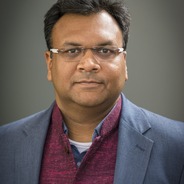
Khanjan Mehta
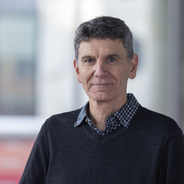
Dr. Jason Sargent
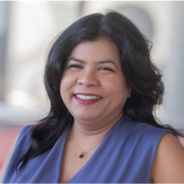
Dr. Chamila Perera
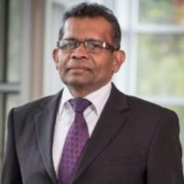
Associate Prof. Chandana Hewege
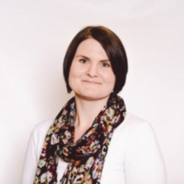
Rachel Mosel
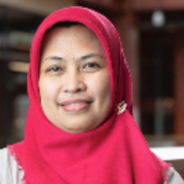
Dr Misita Anwar
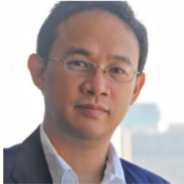
Elmer Soriano, MD MPA
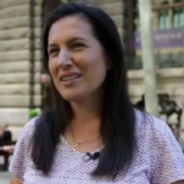
Prof. Katina Michael
